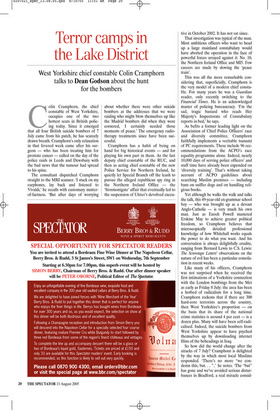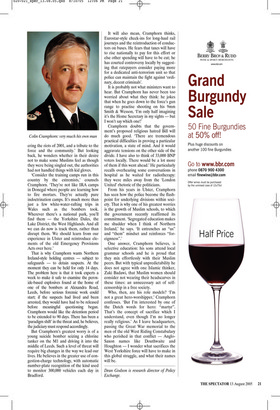Terror camps in the Lake District
West Yorkshire chief constable Colin Cramphorn talks to Dean Godson about the hunt for the bombers Colin Cramphorn, the chief constable of West Yorkshire, occupies one of the two hottest seats in British policing today. Since it emerged that all four British suicide bombers of 7 July came from his patch, he has scarcely drawn breath. Cramphorn’s only relaxation in that fevered week came after his surgeon — who has been treating him for prostate cancer — called on the day of the police raids in Leeds and Dewsbury with the bad news that the tumour had spread to his spine.
The consultant dispatched Cramphorn straight to the MRI scanner. ‘I stuck on my earphones, lay back and listened to Vivaldi,’ he recalls with customary matterof-factness. ‘But after days of worrying about whether there were other suicide bombers at the addresses that we were raiding who might blow themselves up like the Madrid bombers did when they were cornered, I certainly needed those moments of peace.’ The emergency radiotherapy treatments since have been successful.
Cramphorn has a habit of being on hand for big historical events — and for playing his own part in them. As the last deputy chief constable of the RUC, and then as acting chief constable of the new Police Service for Northern Ireland, he quietly let Special Branch off the leash to pursue the alleged republican spy ring in the Northern Ireland Office — the ‘Stormontgate’ affair that eventually led to the suspension of Ulster’s devolved execu tive in October 2002. It has not sat since.
That investigation was typical of the man. Most ambitious officers who want to head up a large mainland constabulary would have aborted the operation in the face of powerful forces arrayed against it: No. 10, the Northern Ireland Office and MI5. Few careers are made by slowing the ‘peace train’.
This was all the more remarkable considering that, superficially, Cramphorn is the very model of a modern chief constable. For many years he was a Guardian reader, only recently switching to the Financial Times. He is an acknowledged master of policing bureaucracy. ‘I’m the sad, tragic bastard who reads Her Majesty’s Inspectorate of Constabulary reports in bed,’ he says.
As befits a former leading light on the Association of Chief Police Officers’ race and diversity committee, Cramphorn faithfully implements a veritable tsunami of PC requirements. These include 96 recommendations from the ACPO’s race equality programme alone. Indeed, nearly 10,000 days of serving police officers’ and staff time have already been expended on ‘diversity training’. That’s without taking account of ACPO guidelines about searching Muslim premises — including bans on sniffer dogs and on handling religious books.
Yet although he walks the walk and talks the talk, this 49-year-old ex-grammar school boy — who was brought up as a devout Anglo-Catholic — is very much his own man. Just as Enoch Powell mastered Erskine May to achieve greater political freedom, so Cramphorn believes that microscopically detailed professional knowledge of how Whitehall works equals the power to do what you want. And his conversation is always delightfully erudite, ranging from Bernard Lewis to C.S. Lewis: The Screwtape Letters’ observations on the nature of evil has been a particular consolation in recent weeks.
Like many of his officers, Cramphorn was not surprised when he received the first intimations of a Yorkshire connection with the London bombings from the Met as early as Friday 8 July: the area has been a hotbed of radicalism for a long time. Cramphorn reckons that if there are 300 hard-core terrorists across the country, then West Yorkshire’s proportion — on the basis that its share of the national crime statistics is around 4 per cent — is a dozen plus. Many will have been self-radicalised. Indeed, the suicide bombers from West Yorkshire appear to have psyched themselves up by downloading internet films of the beheadings in Iraq.
So how did the world change after the attacks of 7 July? Cramphorn is delighted by the way in which most local Muslims responded. ‘There’s no more “we condemn this, but... ”,’ he notes. ‘The “but” has gone and we’ve avoided serious disturbances in Bradford, a real miracle consid ering the riots of 2001, and a tribute to the force and the community.’ But looking back, he wonders whether in their desire not to make some Muslims feel as though they were being singled out, the authorities had not handled things with kid gloves.
‘Consider the training camps run in this country by the extremists,’ counsels Cramphorn. ‘They’re not like IRA camps in Donegal where people are learning how to fire mortars. They’re actually pure indoctrination camps. It’s much more than just a few white-water-rafting trips in Wales such as the bombers took. Wherever there’s a national park, you’ll find them — the Yorkshire Dales, the Lake District, the West Highlands. And all we can do now is track them, rather than disrupt them. We should learn from our experience in Ulster and reintroduce elements of the old Emergency Provisions Acts over here.’ That is why Cramphorn wants Northern Ireland-style holding centres — subject to safeguards — to detain suspects. At the moment they can be held for only 14 days. The problem here is that it took experts a week to make it safe to examine the peroxide-based explosives found at the home of one of the bombers at Alexandra Road, Leeds, before serious forensic work could start; if the suspects had lived and been arrested, they would have had to be released before meaningful questioning began. Cramphorn would like the detention period to be extended to 90 days. There has been a ‘paradigm shift’ in the threat and, he believes, the judiciary must respond accordingly.
But Cramphorn’s greatest worry is of a young suicide bomber seizing a chlorine tanker on the M1 and driving it into the middle of Leeds. Such a level of threat will require big changes in the way we lead our lives. He believes in the greater use of congestion-charge technology, with automatic number-plate recognition of the kind used to monitor 300,000 vehicles each day in Bradford. It will also mean, Cramphorn thinks, Eurostar-style check-ins for long-haul rail journeys and the reintroduction of conductors on buses. He fears that taxes will have to rise nationally to pay for this effort or else other spending will have to be cut; he has courted controversy locally by suggesting that ratepayers consider paying more for a dedicated anti-terrorism unit so that police can maintain the fight against ‘ordinary, decent criminals’.
It is probably not what ministers want to hear. But Cramphorn has never been too worried about what they think: he jokes that when he goes down to the force’s gun range to practise shooting on his 9mm Smith & Wesson, ‘I’m only half imagining it’s the Home Secretary in my sights — but I won’t say which one!’ Cramphorn doubts that the government’s proposed religious hatred Bill will do much good. ‘There are tremendous practical difficulties in proving a particular motivation, a state of mind. And it would aggravate tensions on the other side of the divide. I have also to think of 33,000 BNP voters locally. There would be a lot more of them if this went ahead.’ He particularly recalls overhearing some conversations in hospital as he waited for radiotherapy: they were miles away from the ‘London United’ rhetoric of the politicians.
From his years in Ulster, Cramphorn has seen how the police become the flashpoint for underlying divisions within society. That is why one of his greatest worries is the growth of Muslim schools, to which the government recently reaffirmed its commitment. ‘Segregated education makes me shudder when I think of Northern Ireland,’ he says. ‘It entrenches an “us” and “them” mindset and reinforces “foreignness”.’ One answer, Cramphorn believes, is selective education: his sons attend local grammar schools and he is proud that they mix effortlessly with their Muslim peers. But with typical unpredictability he does not agree with one Islamic thinker, Zaki Badawi, that Muslim women should consider not wearing their headscarves in these times: an unnecessary act of selfcensorship in a free society.
Who, then, are his role models? ‘I’m not a great hero-worshipper,’ Cramphorn confesses. ‘But I’m interested by one of the Dutch words for hero: “martyr”. That’s the concept of sacrifice which I understand, even though I’m no longer really religious.’ As I leave headquarters, passing the Great War memorial to the men of the old West Riding Constabulary who perished in that conflict — AngloSaxon names like Douthwaite and Houghton — I wonder what sacrifices the West Yorkshire force will have to make in this global struggle, and what their names will be.












































 Previous page
Previous page